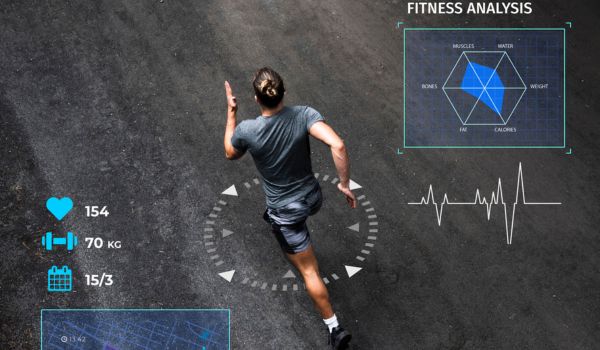Executive Summary:
Through its impact on player performance analysis, fan engagement, and injury prevention, sports AI is transforming the sports industry.
Introduction:
Innovation is essential to the development of the sports business in its always-changing environment. Artificial intelligence (AI) has been a game-changer in recent years, altering how sports are played, coached, and enjoyed.
The application of AI in the sports sector has created a wide range of opportunities, from improving fan engagement to optimizing athlete performance.
In this blog, we’ll examine seven outstanding ways in which sports AI is transforming the industry.
7 Ways Sports AI is Revolutionizing the Sports Industry
-
Performance Analysis and Player Development
Performance analysis now has a new degree of precision thanks to sports AI. Coaches and athletes may now decide on training, strategy, and recovery with the use of data-driven insights.
Athletes can attain their maximum potential with the aid of AI-powered technologies that track every movement, allowing the identification of strengths and deficiencies.
The potential of sports AI to produce data-driven insights is one of the key ways it is transforming the industry. The time when coaches had to make important decisions simply based on their expertise and intuition is long past.
AI-powered systems are now able to handle enormous amounts of data in real time, giving coaches and athletes access to a wealth of knowledge.
-
Injury Prevention and Rehabilitation
AI is advancing the goal of injury prevention, which is a high objective in sports. AI systems can forecast injury risks and recommend preventive actions by evaluating athlete and biomechanical data.
Personalized rehabilitation plans can be created with the help of AI, ensuring a quicker and safer return to the field.
By utilizing advanced data analytic tools to forecast injury risks, AI in the sports industry has transformed injury prevention. In order to find trends and potential weak spots, AI systems are fed biomechanics, player information, and historical injury statistics.
AI is able to notify coaches and medical personnel of potential concerns by detecting minute variations in an athlete’s biomechanics or movement patterns.
-
Data-Based Coaching Strategies
Coaches are increasingly depending on AI to get a competitive edge, thanks to data-driven coaching strategies. Coaches can modify their strategy in-game in real time thanks to sophisticated analytics and machine learning algorithms that process massive volumes of data.
The way teams train and compete is changing as a result of this data-driven strategy.
Real-time game analysis is one of the most revolutionary uses of AI in the sports industry. AI systems process incoming data such as player positioning, ball trajectory, and game dynamics continually throughout matches.
With the use of this real-time analysis, coaches may quickly decide on replacements, tactical modifications, and strategic shifts.
-
Personalized Experiences
The sports industry depends on fan interaction, and artificial intelligence is making it more personalized than ever. AI-powered chatbots and recommendation engines respond to the tastes of each fan by providing specialized material, ticket offers, and product recommendations.
This raises revenue in addition to improving the fan experience. The way that sports fans consume content relating to their favorite teams is changing because of AI-powered chatbots and recommendation engines.
These AI systems examine a tremendous amount of information, including a person’s social media activity, browser history, and previous interactions with sports-related content.
-
Assisting Referees in Fairplay
Artificial intelligence is being utilized to increase the precision of refereeing judgments. Referees can make more accurate decisions, lowering errors and conflicts, with the help of video analysis and instant replays.
This guarantees a more even playing field and upholds the sport’s integrity. A highly challenging component of soccer officiating, offside decisions have also been assisted by AI in the sports industry.
AI systems can swiftly identify whether a player was in an offside position at the time the ball was played by reviewing video footage and player locations. This contributes to more accurate awarding or disallowing of goals.
-
Detecting Injuries on the Field
It’s important for athletes’ safety to recognize injuries during competitions. Artificial intelligence (AI)-enhanced wearable technology can track motions and vital signs in real-time, allowing for quick injury reactions. This technology has shown its ability to drastically reduce the severity of injuries.
The capacity of AI to send out rapid notifications is one of the technology’s most important advantages in harm detection.
The AI system can instantly identify irregularities in the vital sign data if an athlete suffers an injury, such as a concussion, heat illness, or cardiac attack. For instance, a sharp increase in heart rate or an uncharacteristic rise in body temperature may be signs of concern.
-
Sports Analytics and Talent Scouting
AI has completely changed how teams find new players. The utilization of advanced analytical technologies that assess player potential and data benefits the hiring process. Teams may build their rosters more intelligently as a result, which also saves time.
AI in the sports industry dramatically increases how effective reconnaissance is. At a pace and scale that would be hard for people to accomplish alone, it can process and analyze player data.
Teams may now assess a larger pool of players in less time, guaranteeing that no potential talent is overlooked.
Conclusion:
AI in the sports industry is revolutionizing the sector in a variety of ways, from maximizing player performance to improving the spectator experience. The sports world is moving more quickly than ever because of the ongoing development of technology and the incorporation of AI.
Athletes and teams will gain from adopting these advances, while viewers will continue to enjoy the thrill and spectacle of their favorite sports. Sports AI isn’t simply a game-changer; it’s an ongoing revolution.










